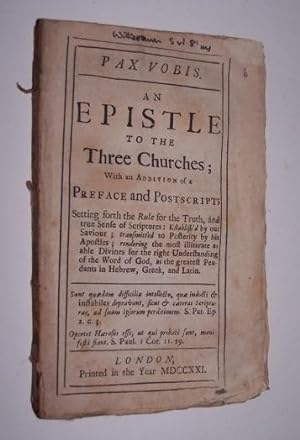About this Item
4 p.l., 3-144 pages; Disbound, small octavo, gathered in fours. Untrimmed edges. This anonymous volume makes an appearance in Halkett and Laing (IV, 315) -- attributed as "[Thomas Fulford?]" The English Short Title Catalogue repeats this, watered down a bit to "Sometimes attributed to Thomas Fulford." Fortunately, the DNB steers us in a different direction. Under the long article about one "Charles Dodd" we learn that the man who wrote under that name was really born as Hugh Tootel. As an English Catholic, he had ample reason to be evasive of easy identification. DNB attributes this 1721 work to Tootel/Dodd, without any question marks or equivocation. The first part of the title is a clear clue to the author's Catholic faith, being a salutation from the Catholic Mass -- PAX VOBIS (meaning "peace to you"). The long subtitle can easily be parsed as philosophically Catholic. ["setting forth the rule for the truth, and true sense of Scriptures: establish'd by our Saviour; transmitted to posterity by his Apostles; rendering the most illiterate as able divines for the right understanding of the word of God, as the greatest peadants in Hebrew, Greek, and Latin."] This is appropriate, since Hugh Tootel, before his formal studies of Philosophy, was born in Durton-in-Broughton , Lancashire and confirmed in the Catholic faith at Euxton Burgh Chapel - the property of the Dalton family, in September 1687 -- the same year that King James II, the last Roman Catholic monarch of England, issued the Declaration of Indulgence. But prospects for English Catholics changed for the worse by the following year, and Hugh Tootel was sent abroad, to be educated at the English College, Douay (1688-1693), and later at St Gregory's Seminary, Paris (1693-1697). In July of 1690, Tootel took the Douay College oath, and in September, he received the minor orders at Cambray from James Theodore de Bayes. He was awarded a B.D. degree from St. Gregory's, Paris and after ordination, returned to England in 1698 as chaplain to the Molyneux family at Mosborough Hall, in his native Lancashire. Hugh Tootel returned to the Continent in 1711, and he is said to have witnessed the siege of Douay in 1712 -- during which he may, or may not, have been Chaplin to an English Regiment. He did publish a short 'History of the English College at Douay' in 1713, and this work ["By R. C."] also represents the start of his habit of disguised authorship, as this work purports to have been written by an English Protestant chaplin. This work also began another tradition of the writings of Hugh Tootel, or "Charles Dodd," as it contained a sharp attack on the Jesuits -- a controversy with the order which would continue until Tootel expressed a desire to die at peace with the Society on his deathbed (in 1743). Between 1716 and 1718, Tootel was back at Mosborough Hall, but returned to Douay to gather materials for his intended major work, 'The Church History of England from 1500 to 1688,' which was to occupy him for twenty years. While back in Douay, Tootel wrote the present book, published in 1721. While the imprint does read "London" -- there is no printer or bookseller specified, and the volume may possibly be of continental origin. In the following year, 1722, Tootel returned to England to serve at Harvington Hall, Worcestershire, where he resided from 1722 until his death, first as assistant chaplain (to a man who used three different names!) -- then (from 1726) as chaplain. At Harvington Hall, in addition to his magnum opus, Tootel/Dodd wrote a number of tracts, most of which remain in manuscript. The big 'Church History of England' was eventually published in three folio volumes, evidently at Wolverhampton - (although the title pages read: "Brussels"). There are many useful details in Joseph Gillow's 'Biographical and Bibliographical Dictionary of the English Catholics' (5 vols, 1885-1902. Gillow, like Hugh Tootel, was a native of Lancashire). Apart from the fact that for the following. Seller Inventory # 41581
Contact seller
Report this item
![]()
